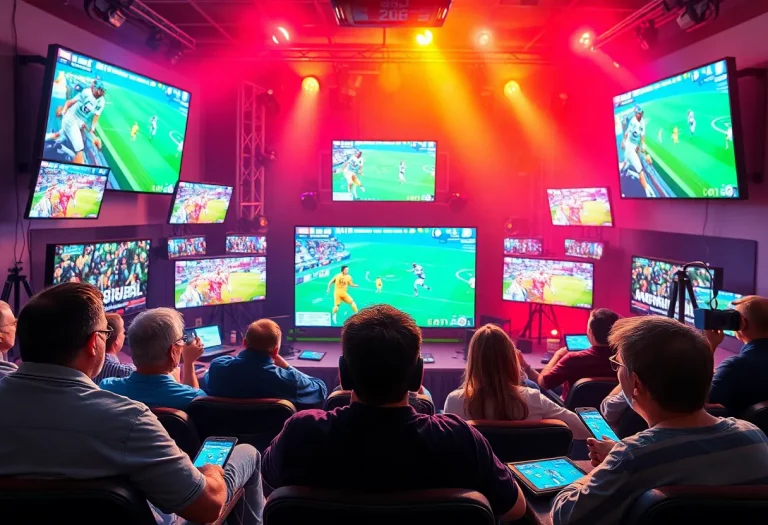News Summary
The Senate Commerce Committee held a hearing titled ‘Field of Streams’ to address the NFL’s move towards streaming services and its implications on traditional broadcasting. Notably absent was NFL Commissioner Roger Goodell, raising concerns regarding the NFL’s adherence to the Sports Broadcasting Act. The committee discussed the impact of NFL streaming on collegiate football and potential changes to broadcasting regulations, emphasizing the need for accessible viewing options for fans amid rising costs and complexities in sports media.
Senate Commerce Committee Looks Into NFL’s Streaming Move
Washington, D.C. has been buzzing with excitement and a fair bit of concern as the Senate Commerce Committee recently held a hearing focusing on how sports are shifting from traditional broadcasting to streaming services. Titled “Field of Streams,” this meeting was aimed at tackling the intricate changes in how fans can catch their favorite sports, particularly football.
Where Was the NFL?
Interestingly, the main player in the room—NFL Commissioner Roger Goodell—did not make an appearance. This absence raised eyebrows among committee members and fans alike, especially as the NFL navigates significant changes in its broadcasting strategies. As the hearing unfolded, Committee Chairman Ted Cruz, representing Texas, shared his worries that the NFL might be overstepping its boundaries, particularly in relation to the Sports Broadcasting Act of 1961.
This act, a key player in sports broadcasting, gives the NFL an antitrust exemption but restricts the league from airing games on Fridays and Saturdays from mid-September to mid-December. Cruz pointed out that the NFL has taken to streaming games on Black Friday—a day that historically clashes with major college football rivalries. This has raised concerns for college and high school football teams and fans, who fear the NFL’s growing influence might overshadow their events.
The Impact of Streaming on Grassroots Football
Cruz emphasized that the Sports Broadcasting Act was designed to protect the interests of college and high school football, ensuring that the NFL’s activities do not negatively impact these levels of the game. The focus on NFL streaming during critical college football weekends seems to blur these lines, driving frustration among fans, students, and players alike.
The discussion around possible changes to the Sports Broadcasting Act under the current Republican-controlled government highlighted the tension between traditional football fans and the league’s evolving strategies. As the hearing progressed, it became evident that the future of sports broadcasting could hinge on how these changes are approached.
Voices from Other Sports
While the NFL remained absent, representatives from the NBA, MLB, and NHL were present to discuss their media rights strategies in the face of an ever-evolving landscape. They provided valuable insights into how their organizations are adapting to the streaming trend, underscoring the fragmented nature of sports broadcasting.
Cruz noted that keeping up with games has never been more complicated or costly for fans. Many struggle to find accessible and affordable options to watch their favorite teams, making the process feel more like solving a difficult puzzle than simply enjoying a game.
Seeking Solutions for Fans
During the discussions, local blackout rules were brought to light, as well as how teams can monitor their local market distribution. One suggestion put forth included improving local market access to games, potentially leading to free broadcasts supported by advertising. This could be a game-changer for fans who currently find it challenging to catch their teams play due to strict broadcasting rules and rising costs.
There were voices of concern from Democratic senators regarding proposed cuts to National Public Radio and PBS, reflecting an overall urge for greater visibility and access across numerous channels available to fans. The idea of having accessible and affordable viewing options for all sports enthusiasts was a recurring theme throughout the hearing.
Looking Ahead
The hearings served as a crucial platform to gather information and analyze policies that could shape the future of sports broadcasting in light of changing consumer needs. With the NFL’s absence—especially at such a pivotal juncture—there may be risks as it navigates scrutiny from lawmakers.
As discussions around streaming partnerships and broadcasting rights continue, the implications for fans and the future of sports remain as intriguing as ever. It is clear that while the field of sports broadcasting is changing, understanding its evolving dynamics will be essential for fans hoping to enjoy an uninterrupted viewing experience.
Deeper Dive: News & Info About This Topic
LIVE BALL Resources
Nolensville Names Scott Stidham as New Football Coach
Fishers, Indiana Hosts 2025 Chipotle Nationals
Texas High School Soccer Teams Set for State Semifinals
Updates on the 2025 MLB Draft You Need to Know
ESPN and NFL Resurrect Talks for $2 Billion NFL Media Acquisition
Canon-McMillan High School to Broadcast Football Games Live
NFL Playoffs Begin: Texans, Chargers, Ravens, and Steelers Set for Wild-Card Weekend Showdown
College Football Playoff Expands to 12 Teams for 2025 Championship in Atlanta
Exciting College Football Bowl Season Kicks Off in Full Swing
NFL’s Christmas Day Lineup: A Holiday Doubleheader with Netflix Streaming and Beyoncé Halftime Show
Additional Resources
- Fox News
- Wikipedia: Sports broadcasting
- NBC Sports
- Google Search: NFL streaming rights
- CNBC
- Google Scholar: Media rights in sports
- Sports Business Journal
- Encyclopedia Britannica: NFL
- Awful Announcing
- Google News: Future of sports broadcasting


